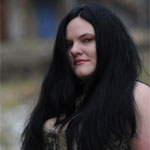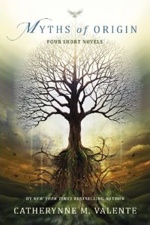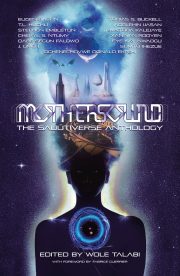Guest Post: Little e, Big B:
Books and EBooks and Love and War
by Catherynne M. Valente
 Here’s the thing. I’m sick to death of talking about ebooks.
Here’s the thing. I’m sick to death of talking about ebooks.
In the current economic and publishing climate, that is a shocking thing to say. Posts about epublishing regularly get the most comments and pingbacks, I’m constantly asked to give talks about my own experiments in that arena, and I usually agree to do them. It is the topic of conversation among authors, agents and publishers alike. How we’re going to adapt, how it will change the publishing environment, how, most importantly, to make money with ebooks.
But I’ve had it. Because something seems to get lost all the time in these endless conversational loops that make me want to embed something in Data’s wrist so that I know how to break the cycle.
And that something is, you know, books.
My interest in ebooks is a tiny percentage of my interest in books. I didn’t dream of being a writer so I could spend my time discussing file formats and what Author X (even if X= me) did to sell a whole bunch of copies. Maybe it’s stupid and romantic, but I got into this because I loved books. Because stories were the most important things in the world to me, and I had so many of them to tell. Don’t get me wrong, there are vital and important things to talk about with regards to ebooks, and it is changing the industry. But when we discuss writing these days, we almost always end up talking about self-publishing and ebooks. And then any other conversation is over.
I and you and everyone has heard a lot about Amanda Hocking in the last year. But no one has ever said to me: Amanda Hocking’s books moved me and spoke to my life, I love them and I read them over and over because they mean so much to me. They say: Amanda Hocking sold a million ebooks. Frankly, I couldn’t tell you one of her titles without Googling if you paid me. And this gets repeated over and over. It doesn’t seem to matter what’s in the ebook as much as that it’s an ebook. I hear about so-and-so and how they charge 99 cents for their ebooks and make money hand over fist. And that’s the topic for an hour in some con bar, and it might not even get mentioned what the book in question is about.
I understand that we’re all just trying to get by in an industry that was always brutally tough. But remember how when we were all kids and wanted to be writers and a big part of that was sitting around with other bookish people and talking about literature? Yeah, me too. Nowhere in there was a deep longing to talk about epub vs MOBI until I can’t remember which one makes techno music.
Even this post (forgive me, Paul, it’s a good and important post, but it feeds my thesis) about why Amazon has become a gatekeeper just as much and in fact more than those evil NY publishers, which is a topic you guys know I feel strongly about, falls into the trap. It lists four reasons people want to be writers, and none of them has anything to do with “I want to tell stories.” They are, instead, status and financially-related reasons. And the sad thing is I believe he is probably right about those reasons for a lot of people who cheer Amazon and sneer at us “dinosaurs.” (Though now that Amazon is breaking into the traditional publishing business, I suspect things will get dicey in Whoville.) Being a Writer has tremendous cultural cache, and it’s part of why everyone and their cat wants to be one.
But it seems to me that ebooks are now a subject almost wholly unrelated to books. It’s about money and it’s about “the industry” and it’s about form, but not content. And not infrequently, it’s about scoring status points by being more plugged in to the new system than thou. And the great conversation has started to accrue a kind of inertia–someone says the Kindle is the future and “trad” publishing is dead, someone else defends traditional publishing and points out Amazon’s robber baron tactics, someone else brings up Smashwords and other indie options, someone else sides with Apple. So-and-so sold a million ebooks. So-and-so turned down a print contract to self-publish. So on and so forth.
Now, obviously, I have been experimenting with publishing on the internet for a long time. This may be coloring my experience, because I am asked to talk about the brave new world of ebooks far more often than if I had never written serial novels online or started mailing wax-sealed stories to people around the world out of my dining room. But the fact is, I would, a thousand times over, rather talk about what I wrote than how I published it. And I feel like stories–you know, those things we’re all fighting for?–are getting lost in the rush to be the one who knows the score, who says the definitive thing about the new tech, or the one who needs the knowledge to be able to launch their own million ebooks empire. Honestly, you’d think there was a prize for the first one to call time of death on traditional publishing, given how popular that headline has become.
It’s a land rush right now. I get it. Boy, do I get it. I’m sure that back in the day every music conference was obsessively buzzing about mp3s. But if you put a penny in a jar for every article you read about ebooks, and took one out for every book review or book discussion you read, I’m willing to bet, for most of us, the jar would never go dry. And I’m guilty of that, too.
So I guess this is a call to arms. I do that from time to time. It’s a habit left over from college. We don’t have to stop talking about ebooks–that’s putting one’s finger in a dyke that has already blown. But let’s talk about books. Let’s allow the fact that our obsession over ebooks stems from a deep and abiding love of books shine through. Let’s take just a cup or two of that excitement about our Star Trek Future!Tablets and use it to get geekyhappythrilled about the actual stories it lets us read with ease. No more namechecking “hot” things we haven’t even looked at because they came in a new business package. When we talk about an electronic publishing success, let’s try reading the books, and then talking about them. We might even learn something about writing and publishing and commercial appeal, something about telling stories, that we couldn’t learn from a hundred tech blogs. That may sound naive, but after being an editor for 18 months I can tell you that even the worst derivative vampire love triangle tale can be what the kids call a “teaching moment” if you let it. And I think we have forgotten to let stories teach us as much as trends do.
Maybe this isn’t a problem for you. Maybe you post every day on GoodReads and tweet about books and giddily talk to your friends about them all the time. Maybe for every post about ebook tech you post two book reviews. Maybe you read every ebook you post about. If so, you are my hero. No joke, my hero. Like Superman, but with books. But it’s been a problem for me. I’m as guilty as anyone else. And I want to be better.
Books are not going away. That much is abundantly clear. There is an incredible hunger for stories out there. And eventually the tech will reach a plateau, until the next revolution. I want to focus on the food that sates that hunger, not the plate it comes on. Read the books, and then talk about them. Read the books, and then talk about them.
Now, if you’ll excuse me, I’m going to go look at the first chapter of one of Amanda Hocking’s books. I think I owe her that.
•••
 Catherynne M. Valente is the New York Times bestselling author of over a dozen works of fiction and poetry, including Palimpsest, the Orphan’s Tales series, Deathless, and the crowdfunded phenomenon The Girl Who Circumnavigated Fairyland in a Ship of Own Making. She is the winner of the Andre Norton Award, the Tiptree Award, the Mythopoeic Award, the Rhysling Award, and the Million Writers Award She has been nominated for the Hugo, Locus, and Spectrum Awards, the Pushcart Prize, and was a finalist for the World Fantasy Award in 2007 and 2009. She lives on an island off the coast of Maine with her partner, two dogs, and enormous cat.
Catherynne M. Valente is the New York Times bestselling author of over a dozen works of fiction and poetry, including Palimpsest, the Orphan’s Tales series, Deathless, and the crowdfunded phenomenon The Girl Who Circumnavigated Fairyland in a Ship of Own Making. She is the winner of the Andre Norton Award, the Tiptree Award, the Mythopoeic Award, the Rhysling Award, and the Million Writers Award She has been nominated for the Hugo, Locus, and Spectrum Awards, the Pushcart Prize, and was a finalist for the World Fantasy Award in 2007 and 2009. She lives on an island off the coast of Maine with her partner, two dogs, and enormous cat.


